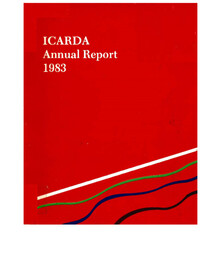ICARDA Annual Report 1983

Authors:
The 1982/83 season had unusual climatic conditions: rainfall was slightly below average, temperatures were lower (8.4°C vs. 10.2°C), and a new minimum of -9.8°C was recorded in January 1983. Frost was severe, with 52 frost days compared to the usual 30, delaying crop growth and causing damage.
ICARDA completed the first stage of developing its computer systems. Tools included ICADET (database management), CRISP (statistical analysis), and MAS (management/accounting system). These improved research efficiency, financial monitoring, and procurement processes.
Two new wheat varieties (Sham 4 – durum, and Sham 2 – bread wheat) were approved for release in Syria. A Genetic Resources Unit was established at Aleppo to manage germplasm, with Italian funding ($840,000) for a new building at Tel Hadya.
Training expanded through collaborative courses and organizational development. Partnerships strengthened with Syrian research institutions, ACSAD, and national programs across the region.
Regional Work:
• Tunisia: National barley program strengthened; ICARDA shifted support focus to pathology.
• Nile Valley Project (Sudan & Egypt): Improved faba bean practices prepared for farmer dissemination.
Major progress in laboratory and training building construction at Tel Hadya. Beginning with this Annual Report, ICARDA will produce Arabic versions of its annual reports for its Arab readers. The Arabic version of this report will follow shortly.
